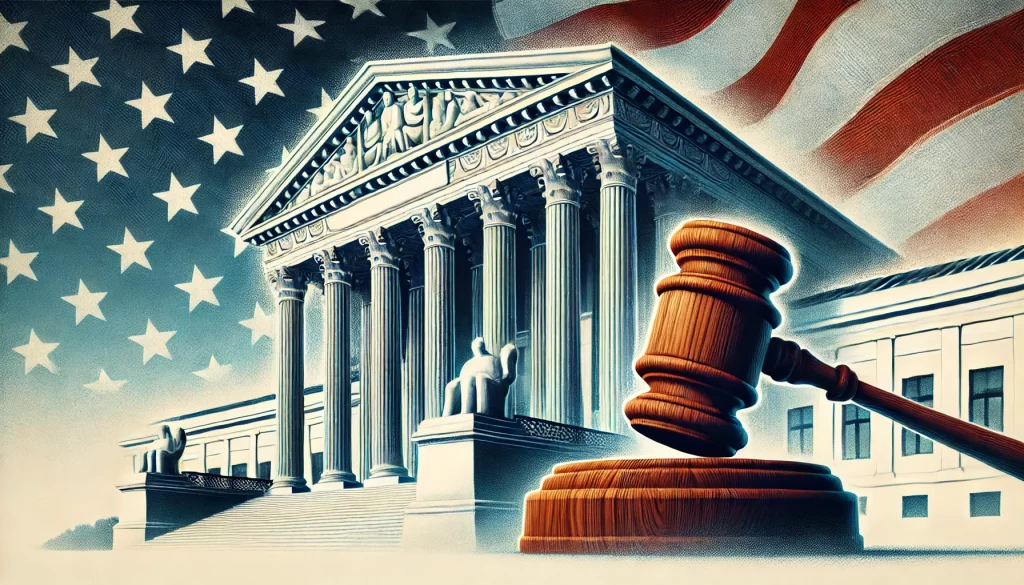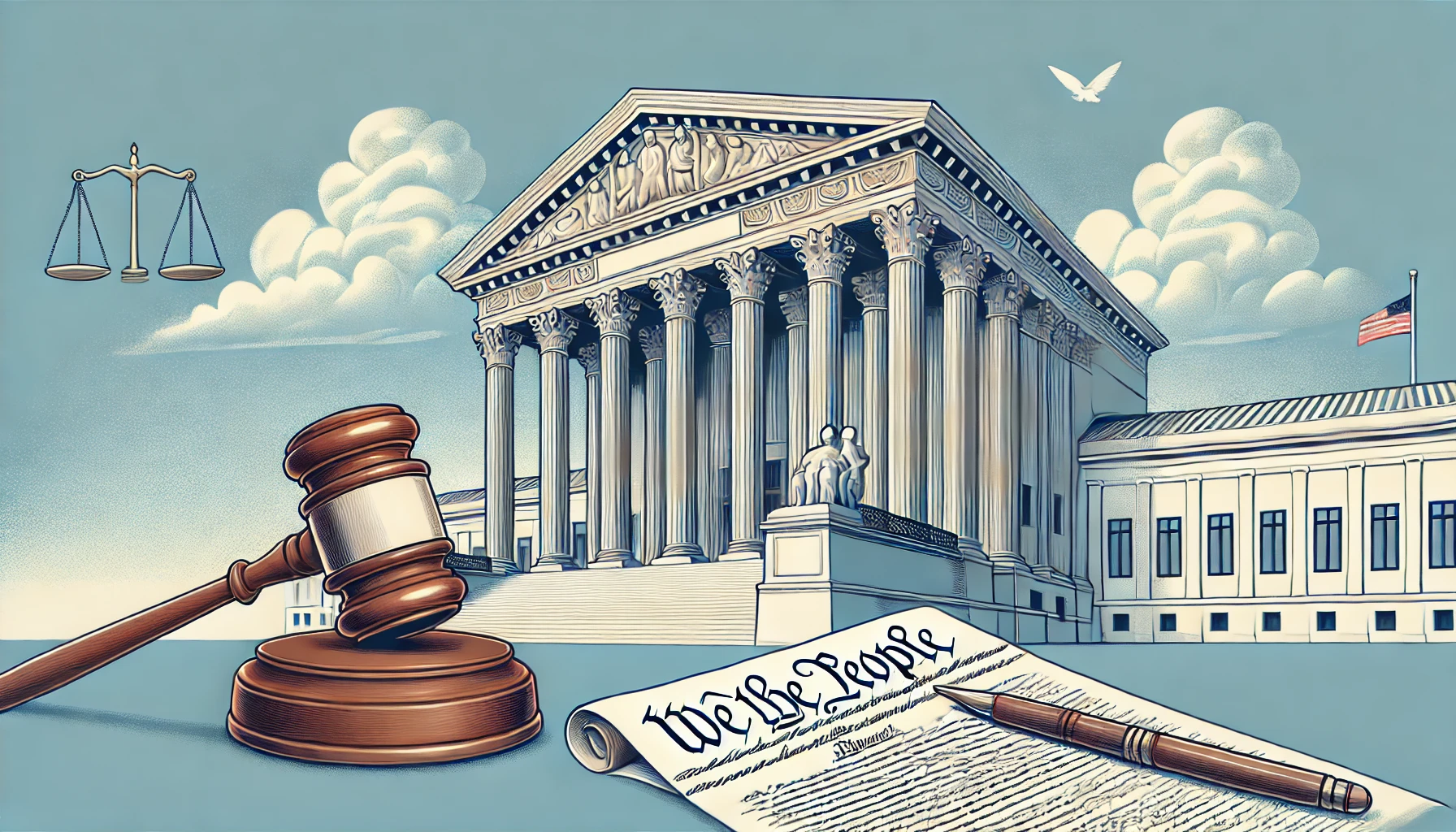On Monday, President Joe Biden unveiled a comprehensive plan to reform the Supreme Court. This initiative aims to restore public trust in the judiciary and ensure that no president is above the law. The proposed changes come in response to recent controversial Supreme Court decisions and ethical scandals involving some of the justices.
The Proposed Reforms
- No One Is Above the Law Amendment: President Biden is advocating for a constitutional amendment to make it clear that former presidents can be prosecuted for crimes committed while in office. This proposal is in direct response to the Supreme Court’s recent decision to grant broad immunity to presidents for their official acts, which Biden criticized as a “dangerous and extreme” ruling. Biden emphasized the foundational principle that “no one is above the law,” stating, “Not the president of the United States. Not a justice on the Supreme Court of the United States. No one.”
- Term Limits for Supreme Court Justices: The United States is the only major constitutional democracy that offers lifetime appointments to its high court justices. Biden proposes introducing 18-year term limits for Supreme Court justices. This reform is intended to ensure regular and predictable changes in the court’s composition, preventing any single presidency from having a disproportionate impact on the judiciary for generations. Under Biden’s plan, a new justice would be appointed every two years.
- Binding Code of Conduct for Justices: Unlike other federal judges, Supreme Court justices currently operate under a voluntary ethics code that lacks enforcement mechanisms. Biden’s proposed code of conduct would require justices to disclose gifts, refrain from engaging in public political activities, and recuse themselves from cases where they or their spouses have financial or other conflicts of interest. This reform aims to address ethical concerns that have recently plagued the court, such as Justice Clarence Thomas’s undisclosed luxury gifts from a billionaire and Justice Samuel Alito’s conflicts of interest.
Rationale Behind the Reforms
The call for these reforms is partly a reaction to the Supreme Court’s decision in July to grant broad immunity to presidents for crimes committed during their official acts. This ruling originated from a case involving former President Donald Trump and has raised fears that future presidents might evade legal consequences for serious misconduct. Biden argues that such a precedent undermines the accountability of the executive branch and endangers democratic principles.
Additionally, the court’s credibility has been damaged by ethical scandals. Instances of justices receiving undisclosed gifts and engaging in politically charged activities have sparked public outcry and diminished trust in the judiciary’s impartiality. Biden noted, “What is happening now is not normal, and it undermines the public’s confidence in the court’s decisions, including those impacting personal freedoms.”

Support and Legislative Challenges
Vice President Kamala Harris, who is expected to be the Democratic presidential nominee following Biden’s decision not to seek re-election, has expressed strong support for the proposed reforms. She stated, “These popular reforms will help to restore confidence in the court, strengthen our democracy, and ensure no one is above the law.”
However, the path to implementing these reforms is fraught with challenges. Term limits and an enforceable code of conduct require congressional approval, and with the House controlled by Republicans and a narrowly divided Senate, securing the necessary votes will be difficult. Constitutional amendments, in particular, face high hurdles, needing two-thirds support in both houses of Congress or a convention called by two-thirds of the states, followed by ratification from three-fourths of the state legislatures.
Political and Public Reactions
The proposed reforms have elicited varied reactions. Many Americans support the idea of term limits for justices and an enforceable ethics code. According to a survey by the Annenberg School for Communication and Dartmouth College, nearly half of Americans favor term limits for Supreme Court justices, and about 60 percent believe at least one justice should be investigated for ethical lapses. However, opinions are sharply divided along partisan lines, with most Democrats supporting the reforms and most Republicans opposing them.
Former President Donald Trump has vehemently criticized Biden’s proposals, accusing Democrats of trying to undermine the judiciary for political gain. Trump stated, “The Democrats are attempting to interfere in the Presidential Election, and destroy our Justice System, by attacking their Political Opponent, ME, and our Honorable Supreme Court.”
Conclusion
President Biden’s proposal marks a significant shift in his stance on Supreme Court reform, highlighting the growing concern over the court’s role and ethical standards. The President is set to formally announce these proposals during a speech at the Lyndon B. Johnson Presidential Library in Austin, Texas, commemorating the 60th anniversary of the Civil Rights Act. While the proposed reforms face substantial legislative challenges, they represent a bold effort to restore faith in the judiciary and reinforce the principle that no one is above the law.
This article is based on the following articles:
https://www.nytimes.com/2024/07/29/us/politics/biden-supreme-court-austin-texas.html

Background Information
The United States Constitution and Amendments
The U.S. Constitution is the supreme law of the United States. It was written in 1787 and established the framework for the federal government. The Constitution can be amended, or changed, through a specific process that requires approval from both Congress and the states. This process is intentionally difficult to ensure that changes are carefully considered and widely agreed upon.
The Supreme Court
The Supreme Court is the highest court in the United States. It has the final say on legal matters and can overturn decisions made by lower courts. The Supreme Court’s rulings can have a significant impact on American law and society. The court is made up of nine justices who serve for life, unless they choose to retire or are impeached for misconduct.
Presidential Immunity
Presidential immunity refers to the legal protection that a sitting president has from being sued or prosecuted for official actions taken while in office. This concept is meant to allow the president to perform their duties without constant legal challenges. However, this immunity does not cover actions that are illegal or unrelated to their official responsibilities.
Recent Supreme Court Decisions
The Supreme Court has made several important and controversial decisions in recent years:
- Roe v. Wade Overturn: This landmark ruling in 1973 legalized abortion nationwide. The recent overturning of this decision has led to significant changes in abortion laws across the country.
- Affirmative Action: This policy was intended to improve opportunities for historically marginalized groups. The Supreme Court has recently limited the use of affirmative action in college admissions.
- Gun Control: The court has blocked some efforts to impose stricter gun control measures.
- LGBTQ Rights: The court has made rulings that affect the rights of LGBTQ individuals, sometimes limiting protections.
Ethical Concerns and Scandals
Several Supreme Court justices have faced ethical questions and scandals. For example:
- Justice Clarence Thomas: He received undisclosed luxury gifts from a billionaire, which raised concerns about potential conflicts of interest.
- Justice Samuel Alito: He was criticized for his wife’s display of politically provocative flags, which some saw as compromising his impartiality.
Legislative Process and Challenges
Passing new laws or amendments involves a complex process:
- Congress: The U.S. Congress is made up of two houses: the Senate and the House of Representatives. For a bill to become law, it must be approved by both houses and signed by the president.
- Filibuster: In the Senate, a filibuster allows a minority of senators to delay or block legislation unless 60 senators vote to end the debate.
- Constitutional Amendments: These require a two-thirds majority in both houses of Congress or a constitutional convention called by two-thirds of the states. After that, three-fourths of the state legislatures must ratify the amendment.
The Civil Rights Act of 1964
This landmark legislation outlawed discrimination based on race, color, religion, sex, or national origin. It was a significant step toward equality in the United States and is often commemorated for its impact on civil rights.
The Role of the President and Vice President
- President: The president is the head of state and government, responsible for enforcing laws, leading the military, and conducting foreign policy.
- Vice President: The vice president supports the president and is next in line for the presidency. The vice president also serves as the president of the Senate and can cast tie-breaking votes.
Political Landscape
The U.S. political system is dominated by two major parties: the Democratic Party and the Republican Party. Each party has different views on issues such as the role of government, economic policy, and social issues. The balance of power between these parties can significantly affect the passage of laws and the implementation of policies.

Debate/Essay Questions
- Should Supreme Court justices have term limits?
- Do recent Supreme Court decisions reflect a crisis of ethics and fairness?
- Should the process of appointing Supreme Court justices be reformed?
- Is the principle that ‘no one is above the law’ adequately upheld in the current U.S. legal system?
Please subscribe to Insight Fortnight, our biweekly newsletter!
